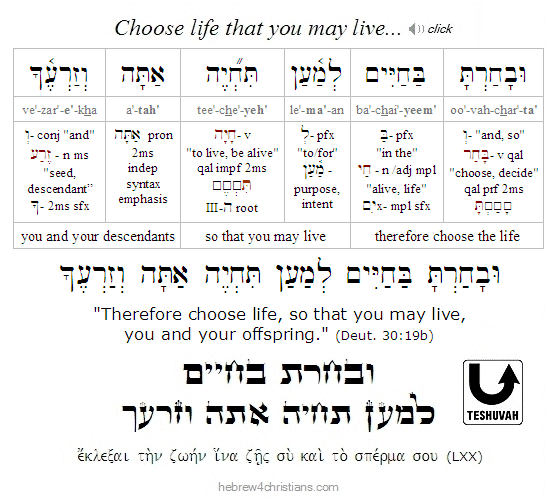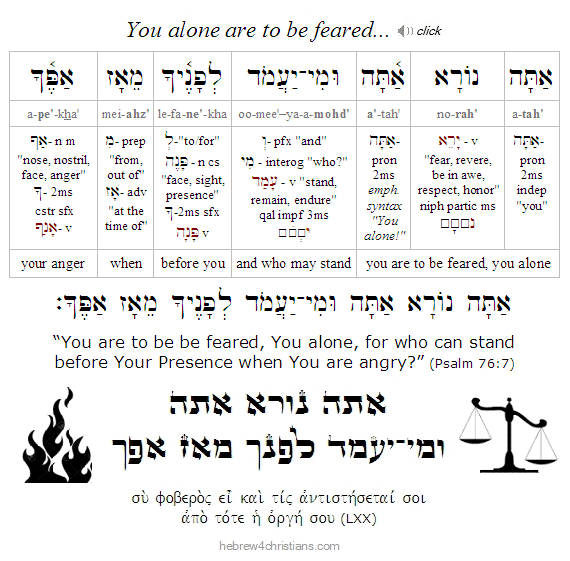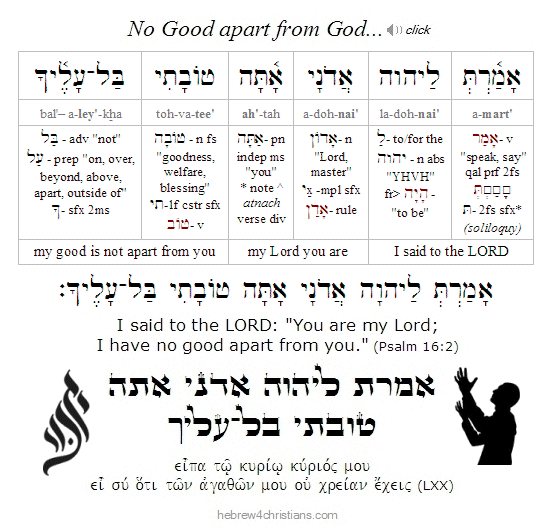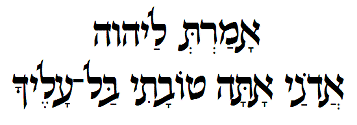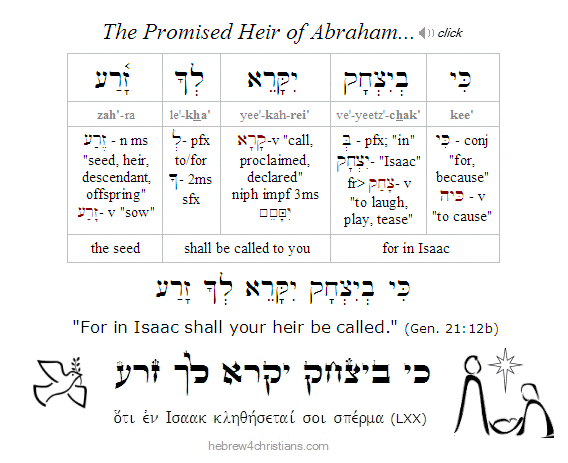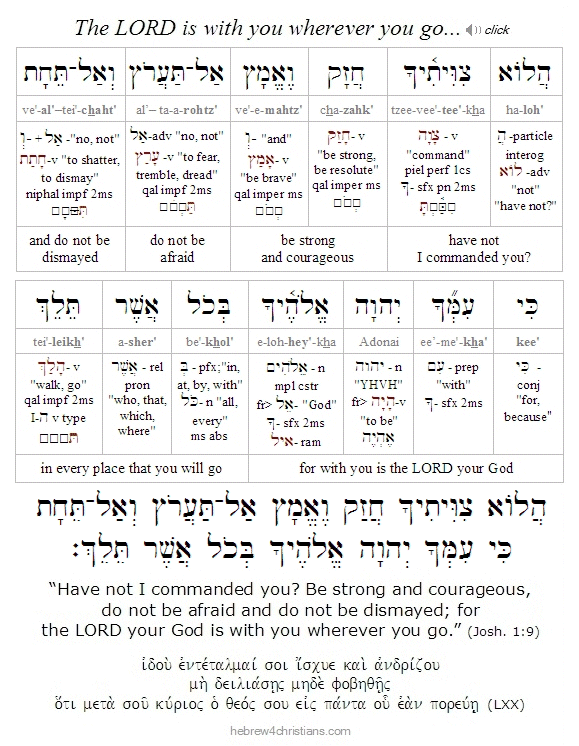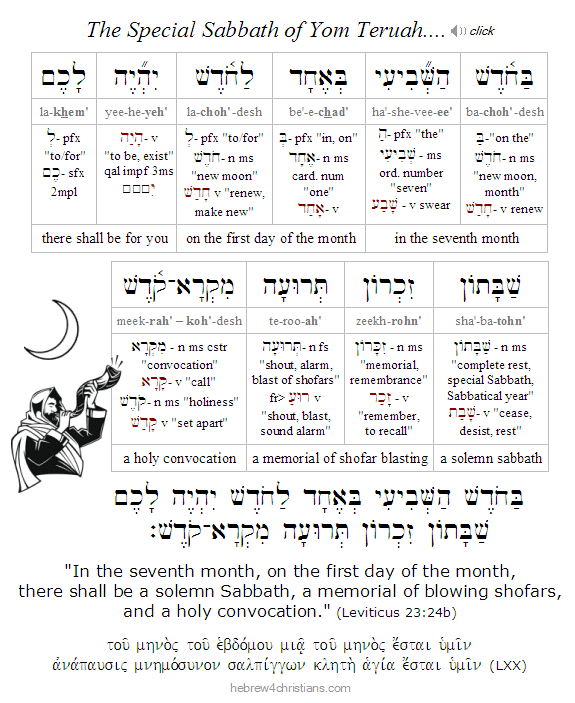|
October 2024 Updates (continued)
Note: If any page content appears to be missing, please refresh the page...
The Ultimate Question...
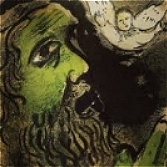
"Every man must choose his world." - A.W. Tozer
10.08.24 (Tishri 6, 5785) "Choose life that you may live.. " (Deut. 30:19). The most significant question God asks is whether you want to live or not. Albert Camus wrote, "There is but one truly serious philosophical problem, and that is suicide. Judging whether life is or is not worth living amounts to answering the fundamental question of philosophy" (Myth of Sisyphus, 1942). Camus' comment is not at all original, indeed, this is the ultimate question of Jesus as well. Do you want to live? Will you believe? Will you choose life and turn away from self-destruction? The Spirit of the LORD calls out: "Choose life that you may live..."
"Our life always expresses the result of our dominant thoughts" (Kierkegaard).
Hebrew Message
Deut. 30:19b on choosing life (click):
Yom Kippur and God's Name...
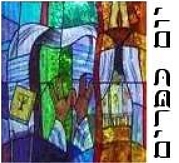
10.07.24 (Tishri 5, 5785) Yom Kippur was the only time when the High Priest could enter the Holy of Holies and call upon the Name of YHVH / YHVH (i.e., יהוה) to offer blood sacrifice for the sins of the people. This "life for a life" principle is the foundation of the sacrificial system and marked the great day of intercession made by the High Priest on behalf of Israel. For this reason it was also called the "Day of God's Mercy," or the "Day of God's Name (יום השם). This alludes to the revelation of the attributes of God's Compassion after the sin of the Golden Calf (see Exod. 34:6-7) -- a disclosure that foreshadowed the New Covenant. How much more, then, is Yom Kippur the "Day of Yeshua's Name" (יום ישוע) since He secured for all of humanity everlasting kapparah (atonement)? Yeshua the Messiah is Moshia ha'olam (מוֹשִׁיעַ הָעוֹלָם), the Savior of the world; He alone possesses the "Name above all other Names" (Phil. 2:9-10; Acts 4:12). It is altogether fitting, then, that God's "hidden Name" (i.e., shem ha-meforash: שֵׁם הַמְּפרָשׁ) was proclaimed before the cover of the Ark of the Covenant in the Holy of Holies while atonement for our sins was made through the sacrificial blood.
This gives us a whole new perspective on Paul's words (Rom. 10:9): "if you confess with your mouth that Yeshua is LORD (יהוה) and believe in your heart that God raised Him from the dead (i.e., that his blood was shed and presented on your behalf upon the heavenly kapporet), then you will be saved (that is, you will be reconciled to God and made a partaker of the atoning work of Yeshua). Surely the Apostle Paul, a zealous rabbi who diligently studied Torah in Jerusalem under Rabbi Gamaliel (who was himself the grandson of the renowned Rabbi Hillel the Elder), understood the theological implications when he stated that the prophecy: "And it shall come to pass that everyone who calls on the Name of the LORD (בְּשֵׁם יְהוָה) shall be saved" (Joel 2:32) applied directly to Yeshua (Rom. 10:10).
Hebrew Lesson
Joel 2:32a Hebrew reading (click):
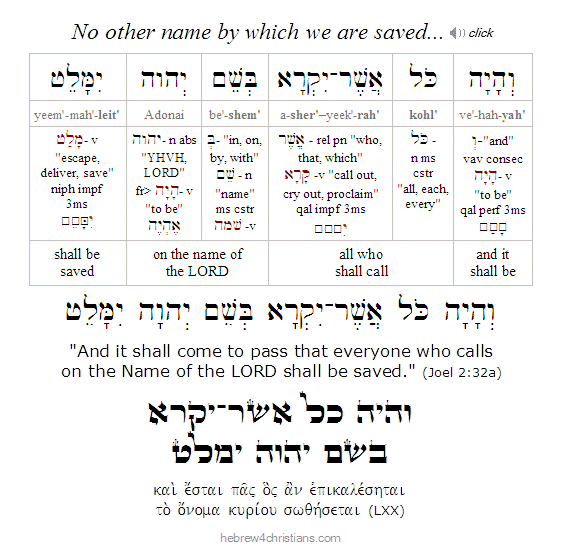 |
Teshuvah of Messiah...
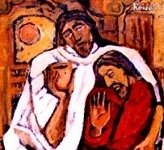
[ "God creates everything out of nothing. And everything which God is to use, he first reduces to nothing." - Soren Kierkegaard ]
10.07.24 (Tishri 5, 5785) "Repent, for the kingdom of heaven has drawn near" (Matt. 3:2). During this "season of teshuvah" (חודש תשובה) it is vital to understand exactly how we are to turn to God to find life.
Some religious people understand "repentance" to mean focusing on themselves, lamenting their sins, and making resolutions to improve their behavior, though this is not the meaning of teshuvah ("repentance") as Yeshua taught, which is turning of the heart in trust of God's love and in the promise of newness of life (John 10:10,28). We do not begin with the imperative to turn until we understand the declaration of God's love given in Messiah. That is the problem of worldly or carnal thinking regarding the gospel. The carnal person imagines the declaration to be the imperative instead of seeing it as the reason for the heart's response to God's unconditional mercy to be received by faith...
"It is no longer 'I' who live but Messiah who lives in me," which means we find life and righteousness in the LORD and not in ourselves -- neither in our resolutions to change, nor in our religious practices, nor even our acts of repentance (Titus 3:5). We are "crucified with" Messiah, and that means the self-life comes to an end (Col. 3:3).
Regarding yourself as separated from God's acceptance will inevitably lead you to the "works of the law" and therefore to the "wheel of sin and death" -- and to despair.
Rightly understood, then, teshuvah cannot be separated from the salvation of the LORD (יְשׁוּעַת יְהוָה), nor can we disregard God's righteousness in the vain attempt to establish our own. Teshuvah receives the miracle of divine exchange: "For our sake he made Him to be sin who knew no sin, so that in Him we might become the righteousness of God" (2 Cor. 5:21).
We do not "reject the grace of God" (Οὐκ ἀθετῶ τὴν χάριν τοῦ θεοῦ) by seeking justification apart from the truth and blessing of Messiah, for He is the one "who loves me and gave himself for me" (Gal. 2:20-21).
The sickness of sin is lethal, and there is no remedy apart from turning to behold Yeshua, the "fiery serpent" lifted upon a stake, the One crucified for our deliverance (Num. 21:8; John 3:14; Gal. 3:13). The teshuvah of God is to turn away from yourself to behold the miracle of God's righteousness given for your sake, and therefore it is a matter of radical faith. "We had the sentence of death in ourselves, that we should not trust in ourselves, but in God who raises the dead" (2 Cor. 1:9). Amen, the verdict of the law condemns us, but God has given us a new covenant (בְּרִית חֲדָשָׁה) in Yeshua the Messiah, "not like the covenant that I made with the fathers on the day when I took them by the hand to bring them out of the land of Egypt" (Jer. 31:31-32), and by means of this new covenant the righteousness of God is given to the one who trusts in sacrificial death of Messiah given on their behalf. "Therefore, if anyone is in Messiah, he is briah chadashah (בְּרִיאָה חֲדָשָׁה), a new creation; the old has passed away; behold, the new has come" (2 Cor. 5:17).
We are told that we must "receive" the life of Yeshua into our hearts, and that is certainly true, but we must also receive his death as well... This is the meaning of "taking up your cross." It is the death of Yeshua in your place that releases you from the tochechah curse of the law (מִקִּלְלַת הַתּוֹרָה), that is, spiritual death, as it is says: "the Messiah has redeemed us from the curse of the law by becoming a curse for us, for it is written, "Cursed is everyone who is hanged on a tree" (Gal. 3:13).
The teshuvah of Yeshua is the miracle of new life; Messiah sets you free from the power of sin and death itself. The repentance of Yeshua is to trust in God's remedy for your sin: "This is the work of God, to believe in the One whom God sent" (John 6:29).
"He saw that there was no man, and wondered that there was no one to intercede; then His own arm brought him salvation, and his righteousness upheld him" (Isa. 59:16). We must turn away from the idea that God demands anything from us other than trust in his love. "Truly, I say to you, unless you turn and become like children, you will never enter the kingdom of heaven" (Matt. 18:3). Stop trying to measure up to his standards. You simply cannot give more than you have the love to give, so you must begin by getting your heart needs met by accepting God's unconditional love. It's not about what you do for God, after all, but about what he does for you. That's the message of the gospel.
Trust that you are rightly related to God because of the salvation of Yeshua, not because of your own efforts at self-improvement. "I tell you the solemn truth, the one who hears my message and believes the One who sent me has eternal life (חַיֵּי עוֹלָם) and will not be condemned, but has passed over (i.e., μετά + βαίνω, lit., "crossed over" [עָבַר]) from death to life" (John 5:24).
We must be careful not to worship an idol, that is, a false concept of God! It is possible to read the Bible, to go to church or synagogue, and yet worship a pagan god. How so? By not knowing the heart of the Father; by not honoring the One who passionately seeks our healing. We know the Father by the Son, that is, in "the language of Son" (Heb. 1:2; Luke 10:21-24). Our heavenly Father is eager to forgive and embrace all of his children.
In Yeshua's famous parable of the "prodigal son," the father saw his child a "long way off" and ran to embrace and kiss him - no questions asked, no explanations needed about his past. When the son nevertheless began reciting his carefully prepared speech of repentance, the father barely listened, and in his overwhelming joy instructed his servants, 'Bring quickly the best robe, and put it on him, and put a ring on his hand, and shoes on his feet. And bring the fattened calf and kill it, and let us eat and celebrate. For this my son was dead, and is alive again; he was lost, and is found...' (Luke 15:20-25).
Hebrew Lesson
Ezekiel 36:26a Hebrew reading (click):
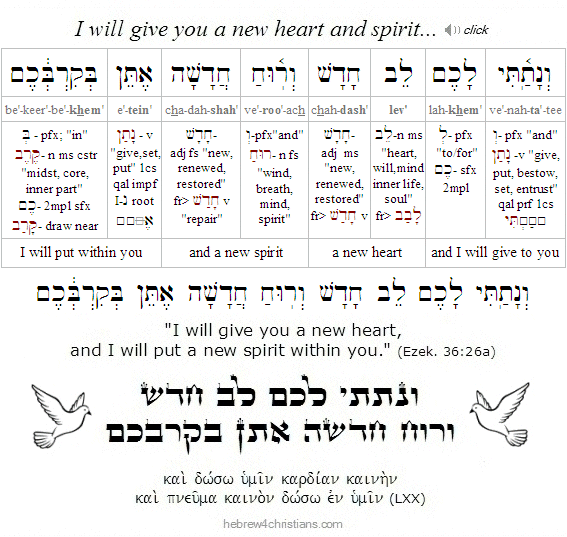 |
Preparing for Yom Kippur...

The weekly Torah reading is suspended because Yom Kippur falls on the Sabbath day this year.. For a list of readings for Yom Kippur, see the parashat Ha'Shavuah page....
10.06.24 (Tishri 4, 5785) Shavuah tov, chaverim! As I mentioned last week, according to Jewish tradition on Rosh Hashanah the destiny of the righteous, or the tzaddikim, are written in the "Book of Life" (סֵפֶר הַחַיִּים), while the destiny of the wicked, or the resha'im, are written in the "Book of Death" (סֶפֶר הַמָּוֵת), though the people "in between" will not be inscribed in either book but are given a period of ten days -- from Rosh Hashanah until Yom Kippur -- to turn to God before their fate is "sealed" for the new year. On Yom Kippur, then, everyone's name will be indelibly written in one or the other of the two books, and the ten days are therefore referred to as aseret yemei teshuvah (עֲשֶׂרֶת יְמֵי תְּשׁוּבָה) - the "Ten Days of Repentance," and yamim nora'im (ימים נוראים) - the "Days of Awe," because repentance at this time (or its lack) will affect the divine decree for the coming year....
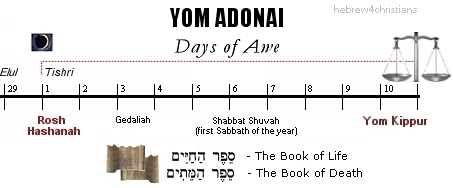 |
The climax of these Ten Days of Awe is a 25 hour fast on Yom Kippur, the "Day of Atonenent," that symbolizes the people's sincere desire to be purified from their sins. The sages state that "afflicting the soul" (Lev. 23:32), or fasting from food and drink, is not undertaken as a means of punishing ourselves for our sins, but is intended to help us focus entirely on our spiritual side, free from carnal interests and concerns. It is a day utterly focused on the LORD and our need for reconciliation and salvation...
The biblical name for the Day of Atonement is Yom Kippurim (יוֹם הַכִּפֻּרִים), meaning "the day of covering(s), atonements, pardons, reconciling." Yom Kippur was the only time when the High Priest would enter the Holy of Holies and utter the Name of YHVH to offer blood sacrifice for the sins of the people. This "life for a life" principle is the foundation of the sacrificial system and marked the day of intercession made by the High Priest on behalf of Israel.
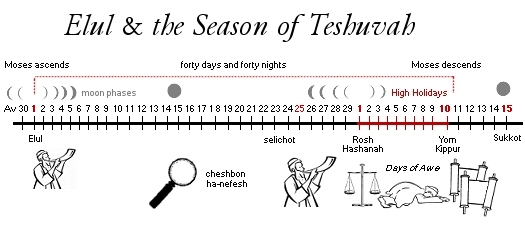 |
Yom Kippur is one of the most important holidays of the Jewish Year and holds tremendous significance regarding the Second Coming of Messiah, the restoration of national Israel, and the final judgment of the world. It is also a day that reveals the High-Priestly work of Yeshua as our Kohen Gadol (High Priest) after the order of Malki-Tzedek (Heb. 5:10, 6:20).
Note that in the Scriptures, Yom Kippur is actually written in the plural in the Torah, Yom Ha-Kippurim (יוֹם הַכִּפֻּרִים), perhaps because the purification process cleansed from a multitude of transgressions, iniquities, and sins. However, the name also prophetically alludes to the two great atonements given by the LORD - the first for those among the nations who turn to Yeshua for cleansing and forgiveness, and the second for the purification of ethnic Israel during Yom Adonai, the great Day of the LORD at the end of days.
Yom Kippur once was called "The Day of Mercy" (יום הרחמים) or "The Day of God's Name" (יום השם), alluding to the revelation of the Name YHVH (יהוה) and the attributes of God's Compassion after the sin of the Golden Calf (Exod. 34:6-7). How much more, then, is Yom Kippur the "Day of Yeshua's Name" since He secured for all of humanity everlasting kapparah (atonement)? Yeshua the Messiah is Moshia ha'olam (מוֹשִׁיעַ הָעוֹלָם), the Savior of the world; His indeed is the "Name above all other Names" (Phil. 2:9-10; Acts 4:12). It is altogether fitting, then, that His "hidden" Name was proclaimed before the kapporet (the cover of the Ark of the Covenant) in the Holy of Holies before the Father for the purification of our sin.
We affirm that Judgment Day has come and eternal justice was served through the sacrificial offering of Yeshua for our sins (2 Cor. 5:21). Yeshua is the complete fulfillment of the Akedah of Isaac. Our names are written in the Lamb's Book of Life, or Sefer HaChayim (Rev. 13:8). We do not believe that we are made acceptable in God's sight by means of "our own works of righteousness" (Titus 3:5-6), though of course that does not excuse us from being without good works (as "fruit" of the Holy Spirit in our lives). Indeed, professing Christians will stand before the Throne of Judgment to account for their lives (2 Cor. 5:10). "Every man's work shall be made manifest: for the day shall declare it, because it shall be revealed by fire; and the fire shall try every man's work of what sort it is" (1 Cor. 3:13). We should walk in "fear and trembling" (Phil. 2:12). Life is an examination, a test, and every moment is irrepeatable. Every "careless" word we utter will be echoed on before heaven (see Matt. 12:36-37). Our future day of judgment is being decided today... May we we awaken to the urgency of the hour and call upon the Name above all names, our great Lord.
Hebrew Lesson
Psalm 76:7 reading (click for audio):
Blessed Need of Heart...
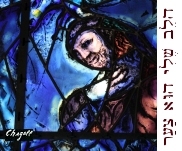
10.04.24 (Tishri 2, 5785) "I need Thee every hour..." More than anything else, God's love is what we desperately need, isn't it? In moments of testing when we feel wounded, alone, unworthy, afraid, and needy; and especially when we succumb to the depths of despair and sickness of heart... God's love descends to the depths of our soul - to the very dust of death itself - to hear our cries and to profoundly touch us...
Praise the Name of Love - despite everything, God saves us from ourselves, from our worst fears, and from the hell of shame and abandonment. My soul yearns for you in the night; my spirit within me earnestly seeks you (Isa. 26:9). I say to the LORD, Adonai atah: "You are my Lord; I have no good apart from you" (Psalm 16:2).
אָמַרְתְּ לַיהוָה אֲדנָי אָתָּה
טוֹבָתִי בַּל־עָלֶיךָ
a·mart · la·doh·nai: · A·doh·nai · ah'·tah
toh·vah·tee · bal - a·ley'·kha
"I said to the LORD, "You are my Lord;
I have no good apart from you." (Psalm 16:2)

The ongoing need for the LORD is perhaps the highest estate of the human soul, even if it is nevertheless attended with heartsickness and unrelenting longing. It is a great, great gift from heaven to know God as your heart's true desire - to fully understand that your relationship with Him is the ultimate concern and treasure of your existence.
The Judgments of God...

"Remember us for life, O King who delights in life, and write us in the Book of Life – for Your sake, O God of life." - Machzor (Zikhronot)
10.04.24 (Tishri 2, 5785) The central theme of Rosh Hashanah is to recall that God is our Creator, our King, and therefore our righteous Judge. Since our souls were created by God, we have the duty to serve Him as our King and live before Him as our Judge. Since the LORD is the God of Truth (יהוה אֵל אֱמֶת) who cannot attest to a lie, every person who has ever lived will necessarily face judgment one day (Heb. 9:27).
There is a midrash about a dialog between Adam and God after Adam's banishment from the Garden of Eden. Adam feared that all humans would later blame him for their mortality, but God replied, "Don't worry about the others. From now on, each soul will be responsible for giving account of his or her life. Each person is required to write his or her own 'Book of Life.' On the Day of Judgment, I simply ratify what has been written."
Indeed, the Scriptures reveal that there are heavenly "books" that contain detailed records of all that we did (or did not do) during our time here on earth: "And I saw the dead, great and small, standing before the throne, and books were opened. Then another book was opened, which is the Book of Life (סֵפֶר הַחַיִּים). And the dead were judged by what was written in the books, according to what they had done" (Rev. 20:12).
Today you are writing the "Book of your Life." Every action you make - every thought, every decision, every deed - is being "recorded" in the archives of Heaven itself. When your soul returns to account for itself before God one day, this "book" will be opened before the Judge of the Universe. As Yeshua said, "on the Day of Judgment (יוֹם הַדִּין) people will give account (ἀποδίδωμι, lit. "give back") every idle word they speak (Matt 12:36). The story of your life will be replayed before all of heaven itself...
There are actually several different judgments described in the Scriptures. For instance, there is: 1) the judgment of believers, sometimes called the "judgment seat of Messiah" (2 Cor. 5:10; Rom. 14:10); 2) the "sheep and goats" judgment at the end of the Great Tribulation period (Matt. 25:31-36), and 3) the "Great White Throne" judgment at the end of the Millennial Kingdom period (Rev. 20:11-15). Common to each of these judgments is the inevitability that all men, both living and dead, saved and unsaved, will ultimately give an account of their lives before Yeshua as the true Judge (John 5:22,27; Rom. 14:11-12; Phil. 2:10-11, cp. Isa. 45:22-23).
Some Christians tend to think that they will not face judgment for their lives here on earth because they are "saved." And while it is gloriously true that Christians will not face condemnation with the world, nonetheless each follower of Yeshua will be required to give account for how he "walked out" his salvation in this world. "For we must all appear before the judgment seat of Messiah (τοῦ βήματος τοῦ Χριστου) so that each one may receive what is due for what he has done in the body, whether good or worthless" (2 Cor. 5:10). It's important to understand that this future judgment is not for the sins of a believer, since the sacrificial death of Yeshua paid the full price for all our sins at the cross (Col. 2:13-14). There is no condemnation to those who belong to Yeshua (Rom. 4:7-8; 8:1; John 5:24). We are justified by faith and now have peace with God because of what Yeshua has done for us (Rom. 5:1). Instead of a judgment regarding our identity (and security) as a child of God, the future judgment of Messiah concerns "giving what is due," or rewarding acts of service done during our allotted time here on earth (i.e., in our mortal state).
To illustrate what this judgment will be like, Paul used the analogy of an elevated platform (or "bema," βῆμα) that held a judge's seat in an ancient Greek sports arena. Athletes would stand before the bema to receive awards based on how well they ran the race. All those who finished the race would pass before the bema, but only those who ran well would receive an award (often an honorary crown or victory wreath). In other words, the believer's judgment will resemble an "awards ceremony" where those who ran the race well would be honored (1 Cor. 9:24-26). The Bema of Messiah is a place where rewards will be given - or lost - depending on how well we have walked out our faith in this life... While some Christians "shall suffer loss" (of rewards), nevertheless, each person attending this judgment "shall be saved" (1 Cor. 3:14-15). Again, this is a believer's judgment before the Messiah based on his or her personal surrender to His will...
Yeshua taught that "everyone who hears these words of mine and does them will be like a wise man who built his house on the rock" (Matt. 7:24). Though the house will be tested by storm and by flood, it will not fall because it had been founded upon the rock... Likewise the Apostle Paul warned us to construct our lives on the solid foundation of the sacrificial work of Yeshua our Messiah (1 Cor. 3:11-15). "Let each one take care how he builds upon it." Choose your building materials wisely. "Wood, hay, and stubble" represent all the "worthless" efforts we make, including those based on self-effort or "religion." Gold, silver, and precious stones represent the work of the Holy Spirit in our hearts. But every believer's works will be tested: "Each one's work (ἔργον) will become manifest, for the Day will disclose it, because it will be revealed by fire, and the fire will test (δοκιμάσει) what sort of work each one has done" (1 Cor. 3:13). Notice that Paul likened the believer's judgment to a fire that tests the quality of materials used to build a house. Good deeds will survive through the fire, whereas worthless (φαῦλος) deeds will be burned up. Again, it's important to understand that the "testing fire" mentioned here is not one of eternal judgment, but rather pictures the burning away of the "worthless matters" (φαῦλος) of this life to reveal what is eternally abiding...
But understand that this "testing fire" is not something we will experience in the far off future. It is not some sort of "purgatory" experience. Today you are in the midst of testing, writing the "Book of your Life," and that includes your refinement for receiving future rewards... The Apostle Peter speaks about the present sorrow we may face through "various trials, so that the tested genuineness of your faith -- more precious than gold that perishes though it is tested by fire -- may be found to result in praise and glory and honor at the revelation of Yeshua the Messiah" (1 Pet. 1:6-7). The suffering we sometimes experience in this life is therefore a refining fire, intended to strengthen our faith and bring glory to the Lord. "For it is time for judgment to begin at the household of God; and if it begins with us, what will be the outcome for those who do not obey the gospel of God?" (1 Pet. 4:17). God tests our hearts so that we will be able to stand before Him without shame on the day of our judgment. "Just as we have borne the image of the man of dust, we shall also bear the image of the man of heaven" (1 Cor. 15:49).
Every one of us will give account of our lives. In Matthew 25:14-30, Yeshua used a parable to indicate what this reckoning will be like. After distributing "talents" to three different servants, a certain "employer" left on a long journey. When he finally returned, he wanted his servants to account for the use of their talents, so he called them to "settle accounts with them" (Matt. 25:19). This phrase "settle accounts" (συναίρει λόγον) means to compare things, to look closely at the records to determine profit or loss to a business, and is therefore similar to the idea of a financial audit. In the parable, the employer considered the state of his business and then called each of his servants in to stand before him for a summary review. Likewise, each of us will be called to stand before the Lord to give account for his or her life. Those who used their talent for the promotion of the Kingdom will be rewarded, but those who wasted their opportunities will not (1 Cor. 3:12-15).
Ultimately each of us will have to confess the truth (ὁμολογέω - "say the same thing") about who we are and what we've become. We can begin that process now through confession of our sins: "For if we would judge ourselves, we should not be judged" (1 Cor. 11:31). If we refuse to do this, we may be "chastened" (παιδευόμεθα) so that we may not be condemned along with the world (1 Cor. 11:32; Heb. 12:5). The image of "testing fire" is a symbol of the examination of our lives by the LORD Himself. "For we shall all stand before the judgment seat of God (τῷ βήματι τοῦ θεοῦ); for it is written, 'As I live, says the Lord, every knee shall bow to me, and every tongue shall confess to God.' So each of us shall give account of himself to God" (Rom. 14:10-12). Ultimately, this confession of the truth is not optional for anyone. For the follower of the Messiah, such confession produces salvation: "for with the mouth one confesses and is saved" (Rom. 10:10). But for those who refuse to undergo self-examination and therefore refuse to confess the truth about their need for salvation, there is the Lord's own reciprocal confession: "Then I will confess to them (ὁμολογήσω αὐτοῖς), 'I never knew you; depart from me, you workers of lawlessness' (Matt. 7:23).
That is why we are commanded: "Examine (πειράζω) yourselves to see whether you are in the faith. Test yourselves (ἑαυτοὺς δοκιμάζετε). Or do you not realize that Yeshua the Messiah is in you, unless indeed you are proved to be rejected (ἀδόκιμος)" (2 Cor. 13:5). This, of course, is the critical test, since without the life of Messiah living within us, we will have no "works of righteousness" that will stand the test. After all, good works are an outflow of the Holy Spirit, and never the result of human effort. However, it is up to us whether we will "be filled with the Spirit" and yield to God's guidance in our lives (Eph. 5:18). Note that the verb "be filled" (πληροῦσθε) is: 1) present tense (i.e., denoting continuous action), 2) imperative ("you must...), and 3) passive voice (i.e., "you must let yourself be filled"). In other words, you must continually let yourself be filled by the Holy Spirit. This is the test of faith, to let Messiah reign within your heart... "Work out your own salvation with fear and trembling, for it is God who works in you..." (Phil. 2:12-13).
We are instructed to practice self-examination (i.e., cheshbon ha'nefesh: חֶשְׁבּוֹן הַנֶּפֶשׁ) before celebrating the "Lord's Table" (i.e., the commemoration of Yeshua's last Passover Seder that prefigured His sacrifice as the Lamb of God who takes away the sins of the world). "Let a person examine himself first (δοκιμάζω - test for authenticity), and then he may eat of the bread and drink from the cup. For anyone who eats and drinks without discerning the body eats and drinks condemnation (κρίμα) on himself" (1 Cor. 11:28-29). Now while it is assuredly true that we should search ourselves in remembrance of our Savior's sacrifice, the practice of self-examination and confession should be part of our everyday lives as followers of the Messiah. The unexamined life -- especially as a Christian -- is not worth living, and the practice of suppressing the truth about our sinful condition can lead to self-deception and even death itself (1 Cor. 11:30). "But if we would judge ourselves, we should not be judged by the Lord" (1 Cor. 11:31). "If we say we have no sin, we deceive ourselves, and the truth is not in us; if we confess our sins, he is faithful and just to forgive us our sins and to cleanse us from all unrighteousness" (1 John 1:7-8). "Therefore, confess (ἐξομολογέω, lit. 'confess out') your sins to one another and pray for one another, that you may be healed" (Jas 5:16).
Life is a serious business, friends, and it is also a test. It is "God who tests our hearts" (1 Thess. 2:4). It is our Lord Yeshua who said, "I am he who searches hearts and minds, and I will repay each of you according to your deeds" (Rev. 2:23). We have one opportunity to live for Yeshua in this life, and the fact that we will each face a day of judgment before the LORD should sober us to sanctity. God holds us responsible for what we think and believe (Acts 17:30-31), and this implies that we have a moral and spiritual duty to think clearly and not abuse our minds (Phil. 4:8; Rom. 12:2). It is the fear of the LORD (יִרְאַת יהוה) that is the beginning of wisdom and knowledge (Psalm 111:10; Prov. 1:7; 9:10). "By the fear of the Lord men depart from evil" (Prov. 16:16). The fear of the LORD is hatred of evil, and therefore, those who love the LORD are called to hate evil (Prov. 8:13; Psalm 97:10). Sin always cheats us of the good. "Blessed is the man that endures testing: for when he has been approved (δόκιμος), he shall receive the crown of life (τὸν στέφανον τῆς ζωῆς) that the Lord has promised to those who love him" (James 1:12).
So are you living in awareness that life is a test and that you will one day stand before Yeshua to give account for every detail of your life? Are you mindful of eternity and of the inevitability of your own personal judgement day? If this causes you anxiety, what do you need to do differently in your life so that you may have confidence for that day? "Therefore we labor... to be well pleasing to Him" (2 Cor. 5:9). We must strive to "lay aside every weight, and the sin which doth so easily beset us" in order to be unhindered in our walk with God (Heb. 12:1). God promises to help us as we endeavor to do his will (1 John 5:14).
There is great glory coming your way, chaverim! May the LORD God help you "to walk in a manner worthy of God, who calls you into his own kingdom and glory" (1 Thess. 2:12). May you be "fully pleasing to him, bearing fruit in every good work and increasing in the knowledge of God. May you be strengthened with all power, according to his glorious might, for all endurance and patience with joy, giving thanks to the Father, who has qualified you to share in the inheritance of the saints in light" (Col. 1:10-12). Amen, and Shanah Tovah!
Hebrew Lesson
Jeremiah 17:10 reading (click for audio):
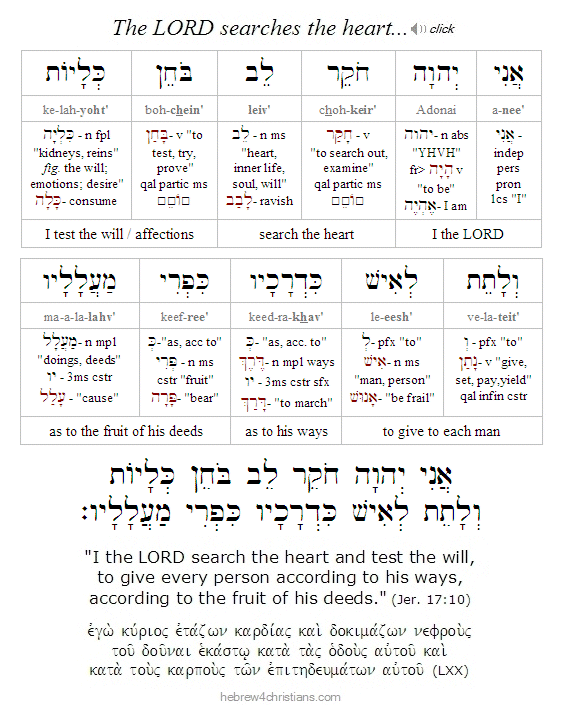 |
Postsript: There is another "book," the Lamb's Book of Life, and all whose names are written therein are imputed the righteousness of Yeshua as the Savior and Sin-Bearer upon the cross, for he became a curse for us so that we become the righteousness of God in Him (2 Cor. 5:21; Gal. 3:13). More on this later, as we approach Yom Kippur...
Teshuvah and Strength...
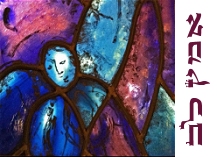
"The Lord bestows his blessings where he finds the vessels empty." - Thomas Kempis
10.04.24 (Tishri 2, 5785) There are moments – dark, gnawing, raw – when you may lose sight of hope, when you might even fear that you have lost your faith – not in God or his promises – but rather in yourself, in your own strength to continue, to stay focused, to keep pressing on "hope against hope..." The remedy here is always the same: to remember that within you – that is, in your flesh - "there is no good thing" and that the miracle of salvation is made secure by God's passion for you, not your own power or desire. "Not by might, nor by power, but by my Spirit, saith the LORD of Hosts."
We don't trust in ourselves nor in the strength of our inner resolve, but solely in the power of God to make the way (John 1:13). We must turn away from ourselves to regain the message of God's unfailing love; only when we lose sight of ourselves do we find ourselves. God redeems you from your lost estate and touches you in your uncleanness; He clothes himself in your pain so that you may be clothed in his love. That never changes, despite dark moments, and to that we must always return...
Hebrew Lesson
Psalm 29:11 reading (click):
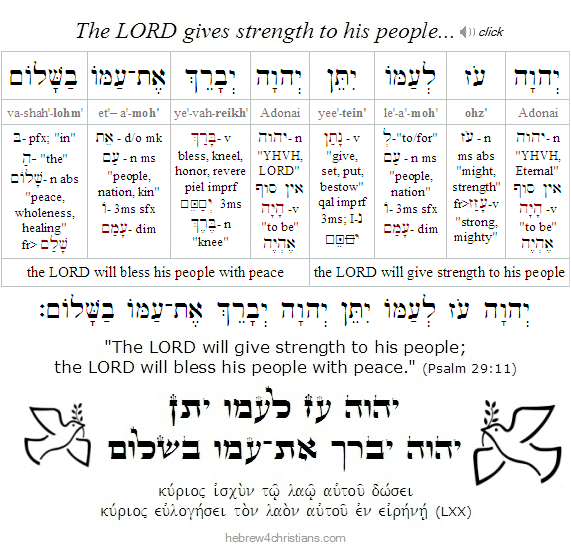 |
Where it says, "I can do all things through Messiah who strengthens me" (Phil 4:13), that includes being healed of the inner pain of your life: your failures, your shame, the ache of rejection, abandonment, and so on. It means being set free from disillusionment, despair, and the oppression of relentless fear. "I can do all things through Messiah" means no longer accepting messages of self-hatred and hopelessness, no longer heeding the malicious whispers that say: "I am of no value," "I am unlovable," "my life is hopeless." No, "I can do all things through Messiah" means learning to be accepted, honored, and esteemed by God; it means opening your heart to God's love and blessing for your life; it means allowing your heart to be made right, to have inner peace... After all, Yeshua's great prayer was that we would know the truth of God's love for us (John 17), and this is the central need our lives.
Torah Readings Rosh Hashanah...

10.03.24 (Tishri 1, 5785) Shanah Tovah, chaverim. Besides the weekly Torah reading for this week (i.e., parashat Ha'azinu) we read some additional passages for the Rosh Hashanah holiday. The Torah reading for the first day of Rosh Hashanah is about the birth of Isaac (see Gen. 21:1-34), and the reading for the second day is on the Akedah, or the binding of Isaac (see Gen. 22:1-22:24), both of which foreshadow Yeshua as the great Lamb of God. We also will take time to reflect on God's Kingship, the Day of Judgment to come, and heed the call of the shofar to usher in the Messianic Kingdom at the End of Days. As with all the Torah holidays, Rosh Hashanah (i.e., Yom Teruah) centers on Yeshua our Messiah, the Great Lamb of God and the true Judge over all. Amen.
The Shepherd's Call...
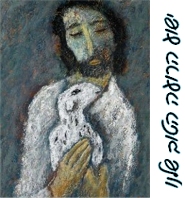
10.03.24 (Tishri 1, 5785) "What do you think? If a man has a hundred sheep, and one of them has gone astray, does he not leave the ninety-nine on the mountains and go in search of the one that went astray? And if he finds it, truly, I say to you, he rejoices over it more than over the ninety-nine that never went astray" (Matt. 18:12-13).
Though it involves sorrow, and the pain of being lost, repentance is ultimately about finding joy, and when we return to God, we have reason to rejoice. The Good Shepherd says, "Rejoice with me, for I have found my sheep that was lost. Just so, I tell you, there will be more joy in heaven over one sinner who repents than over ninety-nine righteous persons who need no repentance" (Luke 15:6-7).
Indeed, the Son of Man came to seek and to save the lost: "For thus says the Lord GOD: Behold, I myself will search for my sheep and I will seek them out... I myself will be the Shepherd of my sheep, and I myself will make them lie down, declares the Lord GOD. I will seek the lost, and I will bring back the banished, and I will bind up the injured, and I will strengthen the sick..." (Ezek. 34:11,15-16).
Hebrew Lesson
Ezekiel 34:11 reading (click for audio):
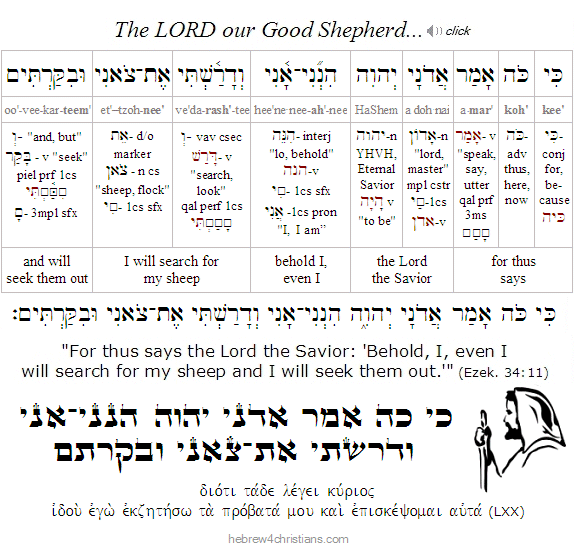 |
The Shofar Call of God...
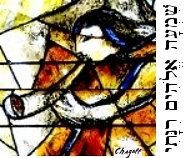
10.03.24 (Tishri 1, 5785) The shofar (ram's horn) is often used as an instrument of spiritual warfare, though it is primarily used to rouse the soul to face reality... Maimonides writes: "There is a hidden message we are supposed to infer by listening to the shofar. It suggests to say: 'Sleeping ones! Awaken from your sleep! Slumbering ones! Awaken from your slumber! Examine your deeds. Remember your Creator and do teshuvah." This idea was earlier stated in the New Testament writings: "Awake, O sleeper, and arise from the dead, and Messiah will shine on you" (Eph. 5:13-14). This theme of "awakening from sleep" is used elsewhere in the Scriptures (e.g., John 11:11, Rom. 13:11, 1 Thess. 5:6, Dan. 12:1-2, Psalm 78:65, etc.). The sound of the shofar calls us to return to the LORD and seek His face. And since finding God is our greatest joy, King David rightly wrote: "Happy is the people who know the teruah [i.e. the shofar blast]" (Psalm 89:16).
Indeed, the word shofar (שׁוֹפָר) comes from a root (שָׁפַר) that means to "amend" or "reform," alluding to the beautification of our ways as we turn to God in teshuvah. "In this month (i.e., the seventh month of Tishrei) you shall amend (shapperu) your deeds. The Holy One, blessed be He, said to Israel: 'If you will amend (shippartem) your deeds I shall become unto you like a horn (shofar). As the horn takes in the breath at one end and sends out at the other, so will I rise from the Throne of Judgment and sit upon the Throne of Mercy and will impart for you the Attribute of Justice into the Attribute of Mercy" (Vayikra Rabbah: 29:6).
May the LORD God of Israel bless you and keep you and shine His glory upon you for this coming new year! And may you be ready to hear the sound of the heavenly shofar that will call you into His glorious presence soon! Amen.
Hebrew Lesson
Psalm 89:15 Hebrew reading (click):
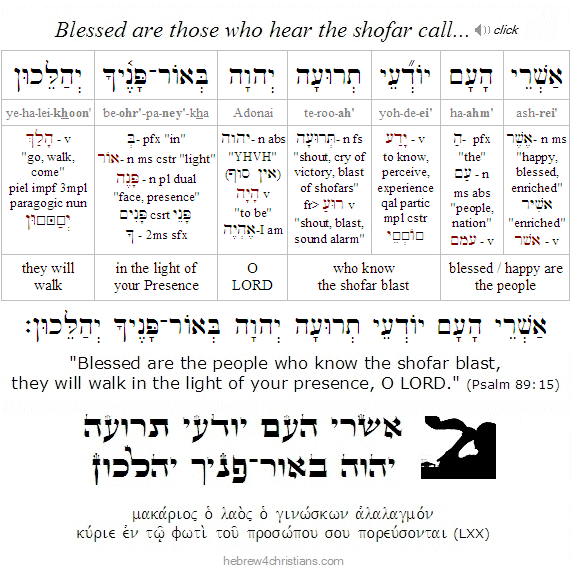 |
Comfort from the Shepherd...
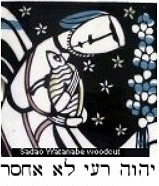
10.03.24 (Tishri 1, 5785) The Spirit of the Lord comforts and reassures those who come to trust in Him: "My sheep hear my voice, and I know them, and they follow me. And I give them eternal life (חַיֵּי עוֹלָם), and they will never perish - no, never! - and no one will snatch them out of my hand" (John 10:27-28).
Note that the Greek grammar in this verse uses a "double negation," which is the strongest way to deny something. In other words, if the question were asked, "Will one of these sheep perish?" the answer is emphatic: "No, no, it will never happen! It is unthinkable!" Indeed all those who belong to Messiah "shall never, ever perish - not into eternity (εἰς τὸν αἰῶνα)." It is an eternal certainty that you who are trusting in Yeshua will never perish, and no power in heaven or earth will be able to take you out of God's hand... "Surely goodness and mercy shall pursue you all the days of your life, and you shall dwell in the Presence of the Lord forever (Psalm 23:6).
Regarding the certainty of salvation Yeshua said: "I tell you the solemn truth, the one who hears my message and believes in the One who sent me has (i.e., ἔχει, present active indicative) eternal life and will not be condemned, but has passed over (i.e., μετά + βαίνω, lit., "crossed over" [עָבַר]) from death to life" (John 5:24).
Note that the verb translated "has passed over" (μεταβέβηκεν) is a perfect active that expresses completed action: "this one has already passed over from death to life." In other words, it is an accomplished spiritual reality though it is only experienced as we surrender to the love and grace of God. As the apostle Paul later summarized: "For it is by grace you have been saved (i.e., σεσῳσμένοι, a perfect passive participle that denotes completed action done on your behalf with effects that continue to the present) through faith, and this not from yourselves, it is the gift of God, not a result of works, so that no one may boast" (Eph. 2:9-10). Ultimately, salvation is a question about who you really are, not about what you do.
God does not want us uncertain or unsure of His great love for us. A fearful believer explained that he was anxious about his acceptance before heaven. When he was asked to define "salvation," he answered, "freedom, deliverance, rest, peace." So you think fear will help you do away with your fear? You are fearful of the idea of freedom from fear?
"Be strong and of good courage" - chazak ve'ematz (חֲזַק וֶאֱמָץ). The LORD God promises "never to leave you nor forsake you," and to be with you wherever you go (Josh. 1:5,9; Heb. 13:15, Psalm 139; Matt. 28:20). In the Greek New Testament the wording of Hebrews 13:15 is highly emphatic: "Not ever will I give up on you (οὐ μή σε ἀνῶ); no, not ever will I leave you behind (οὐδ᾽ οὐ μή σε ἐγκαταλίπω)." May you hear the voice of the Good Shepherd calling you, and may He forever keep you under His watchful care. Amen.
Hebrew Lesson
Joshua 1:9 reading (click for audio):
Our Creator, Our King...
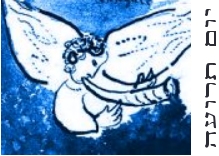
[ Rosh Hashanah begins this evening at sundown and runs through the following day... ]
10.02.24 (Elul 29, 5784) Both the Torah of Moses and the New Testament attest that Yeshua is Elohim (אֱלהִים) -- the Creator of the cosmos: בְּרֵאשִׁית הָיָה הַדָּבָר / "in the beginning was the Word" (John 1:1,14). The Divine Word and Voice cannot be separated from God any more than the Spirit of God can be separated. Yeshua is the Source of all life in the universe: כָּל־הַמַּעֲשִׂים נִהְיוּ עַל־יָדוֹ / "All things were made by Him (John 1:3). The "Word made flesh" is the "image of the invisible God" and the "radiance of the glory of God and the exact imprint (χαρακτήρ, 'character') of his nature" (Col. 1:15). All of creation is being constantly upheld by the word of His power (Heb. 1:3): "All things were created by Him (i.e., Yeshua), and for Him" and in Him all things consist (συνεστηκεν, lit. "stick together") (Col. 1:16-17). As our Creator and Master of the Universe, Yeshua is both our King and our Judge, and therefore Rosh Hashanah (i.e., Yom Teruah) centers on Him.
But in addition to God's power and sovereignty as our Creator, we note that the Scriptures begin and end with the redemptive love of God. Yeshua is the Center of Creation - it's beginning and end. As it is written: אָנכִי אָלֶף וְתָו רִאשׁוֹן וְאַחֲרוֹן ראשׁ וָסוֹף / "I am the 'A' and the 'Z,' the First and the Last, the Beginning and the End" (Rev. 22:13). Indeed, Yeshua is מֶלֶךְ מַלְכֵי הַמְּלָכִים / Melech Malchei Hamelachim: The "King of kings of kings." He is LORD of all possible worlds -- from the highest of celestial glories to the very dust of death upon a cross... יְהִי שֵׁם יהוה מְברָךְ / yehi shem Adonai mevorakh: "Let the Name of the LORD be blessed" forever and ever (Psalm 113:2).
Hebrew Lesson
Revelation 4:11 reading (click for audio):
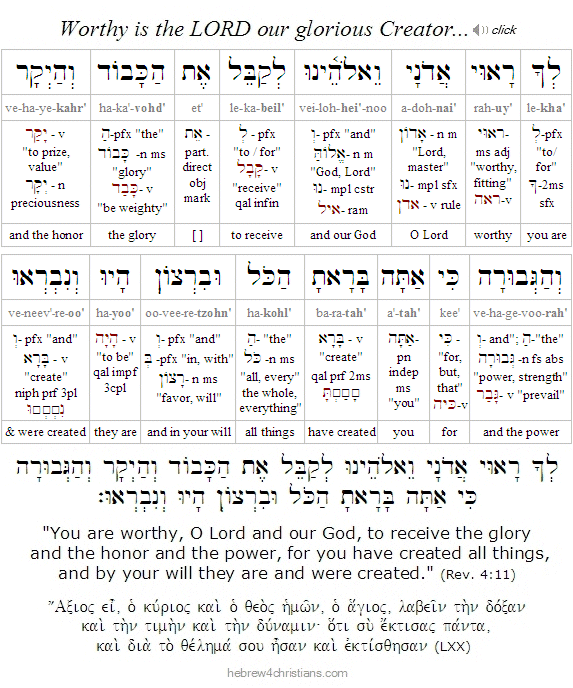 |
The central point of all true Torah, then, is the redemptive love of God demonstrated in the "first and last" principle of sacrificial life. This was prefigured in the original paradise when Adam and Eve were clothed by the lamb sacrificed for their transgression (Gen. 3:21), and the theme continues throughout the Torah, for example, in the account of the sacrifice of Isaac (we blow the shofar on Rosh Hashanah to recall the Lamb of God given in his place), in the visions of Jacob, in the commissioning of Moses, in the redemption from death by the blood of the sacrificed lamb in Egypt, and by the climactic revelation of the altar given at Sinai (i.e., the Tabernacle). Just as the "korban tamid" of the Temple (i.e., the continual sacrifice of the lamb upon the altar) recalled the original Passover and foretold of the Lamb of God to come, so Yeshua, the "Living Torah," embodied the Sacrificial Life itself, the true Lamb of God that was offered upon the stigma of the cross, to demonstrate God's infinite condescension, mercy and love that redeems the world from sin and death. Just as there is no Passover apart from the Lamb, so there is no "Rosh Hashanah" or "Yom Kippur" apart from God's atoning love given in the Messiah... Now THAT is something for us to make a "teruah," or a "joyful noise" in praise to our God!
Hebrew Lesson
Psalm 100:1-2a reading (click for audio):
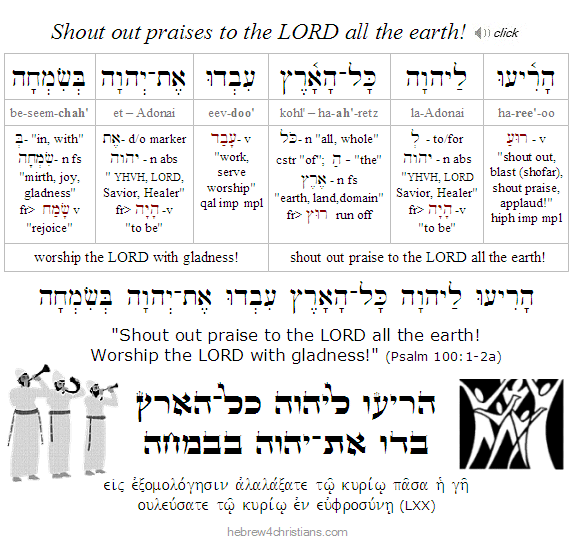 |
Note: For more on this, see "High Holidays and the Gospel."
The Special Time of Yom Teruah...

10.02.24 (Elul 29, 5784) The "Festival of Shofars" (i.e., yom teruah: יוֹם תְּרוּעָה), otherwise known as Rosh Hashanah (ראש השנה) in Jewish tradition, begins this evening at sundown! The call of the great shofar is to be heard, and we are close to the calling up of God's people and the Great Tribulation to begin. Israel is at war, surrounded by her enemies; there are worldwide tremors, engineered plagues, nation rising up against nation, people's hearts failing them for fear, worldwide apostasy and godlessness, and the love of many runs cold... A time of testing is approaching. Look up, for the day of redemption draws near, friends.
Let's make a joyful noise of praise to our God! L'shanah tovah b'Yeshua, chaverim!
Hebrew Lesson
Lev. 23:24 reading (click for audio):
Listen to the Shofar!
There are four primary types of shofar blasts, though some of these may be combined:
- Tekiah (תְּקִיעָה) - A long single blast (the sound of the King's coronation)
- Shevarim (שְׁבָרִים) - Three short wail-like blasts (signifying repentance)
- Teru'ah (תְּרוּעָה) - Nine staccato blasts of alarm (to awaken the soul)
- Tekiah ha-Gadolah(תְּקִיעָה הַגְּדוֹלָה) - A great long blast (for as long as you can blow!)
The general custom is to first blow tekiah, followed by shevarim, followed by teruah, and to close with tekiah ha'gedolah:
Torah and Rosh Hashanah...
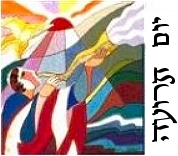
[ The holiday of Rosh Hashanah (Yom Teruah) begins this evening at sundown... ]
10.02.24 (Elul 29, 5784) Though the term "Rosh Hashanah" (ראש השנה) does not explicitly occur in the Torah, the beginning of the 7th month (i.e., Tishri 1) is clearly to be set apart as "Yom Teruah" (יום תרועה), a day of shofar blowing (see Lev. 23:24-25, Num. 29:1-2). When we consult Jewish tradition for some additional insight about what this means, we discover that the sages and great commentators of the Torah universally regarded the number seven as the number of completeness. Just as the seventh day of the week was considered sacred, so too is the seventh month of the year. Therefore the sages reasoned that since each new moon (rosh chodesh) is regarded as a sacred time (see Num. 10:10), it's logical that the seventh new moon (counting from Nisan in the spring) should acquire special sanctity. This conclusion seems especially justified in this case because God directly commanded Israel to sanctify the seventh month as a solemn day of "remembrance and shofar blowing" (זִכְרוֹן תְּרוּעָה). Therefore while it is clear that the new moon of the seventh month is to be observed as "Yom Teruah," it nevertheless has a somewhat "concealed" significance, suggestive of the absence of the moon on that date itself...
Note, however, that the Torah calls the end of the harvest year (in the fall) the "end of the year" (i.e., חַג הָאָסִף בְּצֵאת הַשָּׁנָה, see Exod. 23:16), which implies both the start of a new year and the symmetry of the calendar: the fall festivals "mirror" the spring festivals and correspond to one another. Just as there is a "new year" in the spring, on the new moon of Nisan (i.e., Rosh Chodashim), so there is in the fall, on the new moon of Tishri, the seventh month... The Psalmist likewise regarded the new moon of the seventh month as especially significant (Psalm 81:3-4). And after the return of the exiles, Ezra the Scribe gathered the people at the Water Gate in Jerusalem on the first of Tishri to read the Torah before the people (see Neh. 8:1-9). Ezra's action may have been the precedent among the later sages for investing Tishri 1 with its distinctive status. That is why we make a "teruah" shout of thanks to God in anticipation of the fulfillment of God's promises and redemptive purposes during the End of Days.
The question about Rosh Hashanah has to do with the authority of Jewish tradition itself. Does the Jewish community have sanction to establish the date of Hebrew calendar? To establish the start of the month? To determine if a year was shemittah (a sabbatical year)? To sound the shofar and declare a Jubilee? According to Moses, the answer is a qualified "yes." After all, it's clear that Moses established judges and courts to determine such matters and to develop case law based on the precepts of the Torah (e.g., see Deut. 16:18). This "chain of authority" was later codified by the sages of the Mishnah, who said it was given by God first to Moses, then Joshua, then to the 70 elders, then to the prophets, and then to Ezra and the men of the Great Assembly (Pirke Avot 1:1). And according to "mainstream" Jewish tradition, Tishri 1 has been established as a "rosh hashanah" from at least the time of the return of the exiles (4th century BC). This is further attested by Flavius Josephus (first century AD) who wrote: "Moses ... appointed Nisan ... as the first month for the festivals ... the commencement of the year for everything relating to divine worship, but for selling and buying and other civil affairs he preserved the ancient order [i. e. the year beginning with Tishri]" (Antiquities 1.81). Even Yeshua Himself endorsed Ezra's division of the Scriptures into the "Law, Writings, and the Prophets" and said that not a "jot or a tittle" (kotzo shel Yod) would pass from the Torah until all was fulfilled (Luke 24:44; Matt. 5:18).
That said, there are undoubtedly a lot of Rabbinical "additions" that have accrued to the holiday over the centuries, especially since the destruction of the Second Temple. Despite this, hovever, let me suggest that many of the traditions of Rosh Hashanah can be genuinely helpful for us. For instance, undergoing self-examination and doing teshuvah are commanded by God and inherently valuable exercises for followers of Yeshua (see Lam. 3:40; Haggai 1:5; Psalm 119:59; Matt. 7:3-5, Gal. 6:3-4, 1 Cor. 11:28, 2 Cor. 13:5, James 5:16, 1 John 1:8-9, etc.). Setting aside 40 days each year to help us turn away from sin is a healing custom, especially if it's done in light of truth of the gospel message. After all, Christians will stand before the Throne of Judgment (kisei ha-din) to give account for their lives to God (see 2 Cor. 5:10). As it is written: "Every man's work shall be made manifest: for the day shall declare it, because it shall be revealed by fire; and the fire shall try every man's work of what sort it is" (1 Cor. 3:13). The foundation of every true work of God comes from trusting in the finished work of Yeshua the Messiah, and the work of our faith will be tested and judged. We have great consolation in our testings, friends: if we are honest with the Lord and appeal to Him for help, He promises to be there for us (Heb. 4:15-16).
For more on this subject, see Is Rosh Hashanah Biblical?
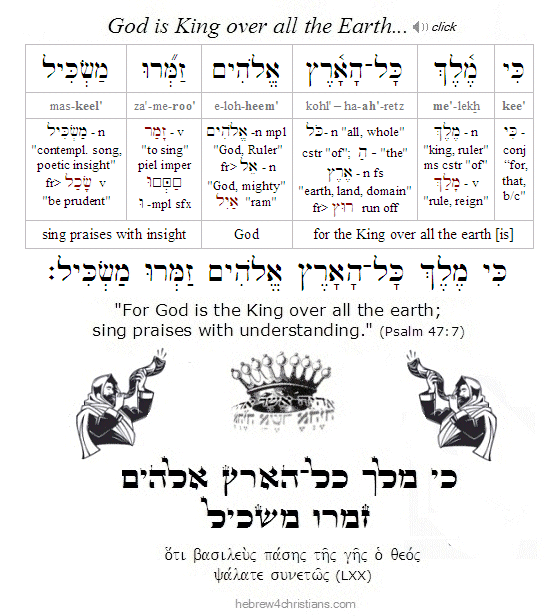 |
The Torah of your Life...

[ The appointed time of Yom Teruah begins Wed. Oct 2nd at sundown this year... ]
10.01.24 (Elul 28, 5784) The underlying assumption at work behind the call to do teshuvah is that your life matters and your actions carry profound significance - both in this world and in the world to come. Sin is so dangerous because it damages our very essence, and if unremedied, such damage will be irreversible. Therefore today is the day to seek healing, for your days are numbered in this world and every day you live ratifies the end of your life. The sages say "mitzvah goreret mitzvah" (מצווה גוֹרֶרֶת מְצוּוֶה) - "the reward for a mitzvah (i.e., blessing) is another mitzvah" (Avot 4:2), though of course the logical corollary is also true, "the reward for a sin is another sin."
"It is a serious thing to live in a society of possible gods and goddesses, to remember that the dullest most uninteresting person you can talk to may one day be a creature which, if you saw it now, you would be strongly tempted to worship, or else a horror and a corruption such as you now meet, if at all, only in a nightmare. All day long we are, in some degree [going] to one or the other of these destinations. It is in the light of these overwhelming possibilities, it is with the awe and the circumspection proper to them, that we should conduct all of our dealings..." (C.S. Lewis: Weight of Glory)
In the Talmud (Makkot 2:6) we read, "They asked of Wisdom: 'What is the sinner's punishment?' It replied, "Evil pursues the sinners" (Prov. 13:21). They asked Prophecy: 'What is the sinner's punishment?' It replied, "The soul that sins shall die" (Ezek. 18:4). Then they asked the Holy One, blessed be He, 'What is the sinner's punishment?' He replied, "He should turn to me and be forgiven. This is the meaning of the verse, "Therefore he guides sinners in the way" (Psalm 25:8) - God guides sinners to do teshuvah so they may find life.
Hebrew Lesson
Psalm 25:8 reading (click for audio):
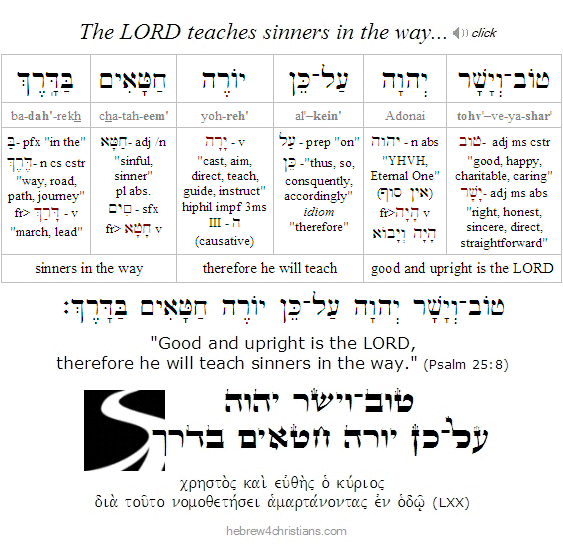 |
What is God like - what is His heart - is the first question, and how we answer that will determine how we deal with all the other questions that come up in theology... What do you feel inside when you stare up at the ceiling before you go to bed? In light of the ambiguity and heartaches of life we might wonder if God is there for us. Does God care? Is He angry at me? Does He really love me? This is the raw place of faith, where we live in the midst of our questions. The Name YHVH (יהוה) means "He is present," even when we are unconscious of His Presence in the hour of our greatest need.
The Blessing of the Struggle...
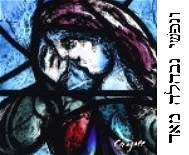
[ Discipleship is the process of becoming who Jesus would be if he were you. - Dallas Willard ]
10.01.24 (Elul 28, 5784) Recently I mentioned that we are part of a seemingly endless journey of falling down and getting back up once again. It is this struggle, this "good fight of faith," that eventually ennobles the heart and establishes character... The hidden blessing of our repeated failure, then, is that we attain genuine humility as we rely on God for the miracle of deliverance. When we draw near to God in confession of our weakness, we may discover that our struggle disguises unacknowledged need within. For example, we might wrestle with lust, but this may come from refusing to trust others or from a sense of loneliness and sadness... "Hurt people hurt people," which means that often our sins come from a place of inner pain of abandonment. When we confess the truth we are enabled to draw close to God - the God of Truth - to discover his mercy. Those things you believe make you unlovable are the very means by which God manifests the glory of His compassion and love for you. It is not judgment that breaks the heart, but mercy and love.
This is why during the High Holidays we recite prayers for forgiveness (i.e., selichot) in the plural, listing all the sins from "A" to "Z" that we (collectively) have committed. We use plural pronouns out of a sense of compassion... We are one body. When some part of the body is sick, the whole body is sick; when one of us sins, he hurts all the flock (1 Cor. 12:26). Therefore the traditional selichot prayer mentions all the possible sins in the order of the Hebrew alphabet: Ashamnu, "we have sinned," begins with the letter Aleph; Bagadnu, "we have been false," begins with Bet; Gazalnu, "we have robbed," begins with Gimmel, and so on... Just as Yeshua taught us, "Avinu She'bashamayim" - our Father, forgive us of our sins, so "all Israel is responsible one for another." "Compassion" means that others' sins and failures don't make them different from us, but rather more like ourselves. It is "feeling with" the heart for the sake of the other in empathy. As it is written: "Confess your faults one to another, and pray one for another, that you all may be healed" (James 5:16).
Hebrew Lesson
Psalm 103:3 reading (click for audio):
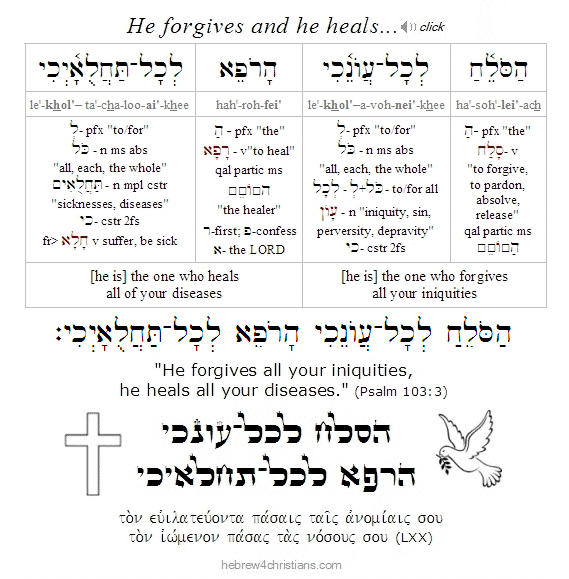 |
<< Return
|
|














